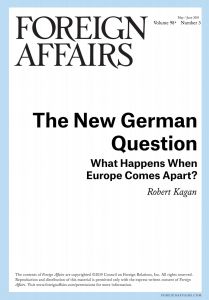Join getAbstract to access the summary!

Join getAbstract to access the summary!
Robert Kagan
The New German Question
What Happens When Europe Comes Apart?
Foreign Affairs, 2019
What's inside?
The disintegration of the post-war liberal international order could re-open the “German Question.”
Recommendation
The post-World War II liberal international order that helped maintain European peace and prosperity arose from “unique,” “abnormal” and “ahistorical” circumstances, argues American historian Robert Kagan. In an essay published in Foreign Affairs, he warns that unwinding that order could unleash dangerous geopolitical dynamics that plunged Europe into darkness twice before. His sobering analysis will help everyone interested in international politics put daily headline news – from Brexit to the rise of nationalism in Europe – into historical context.
Summary
About the Author
Robert Kagan is a senior fellow at the Brookings Institution and the author of The Jungle Grows Back: America and Our Imperiled World.


















Comment on this summary